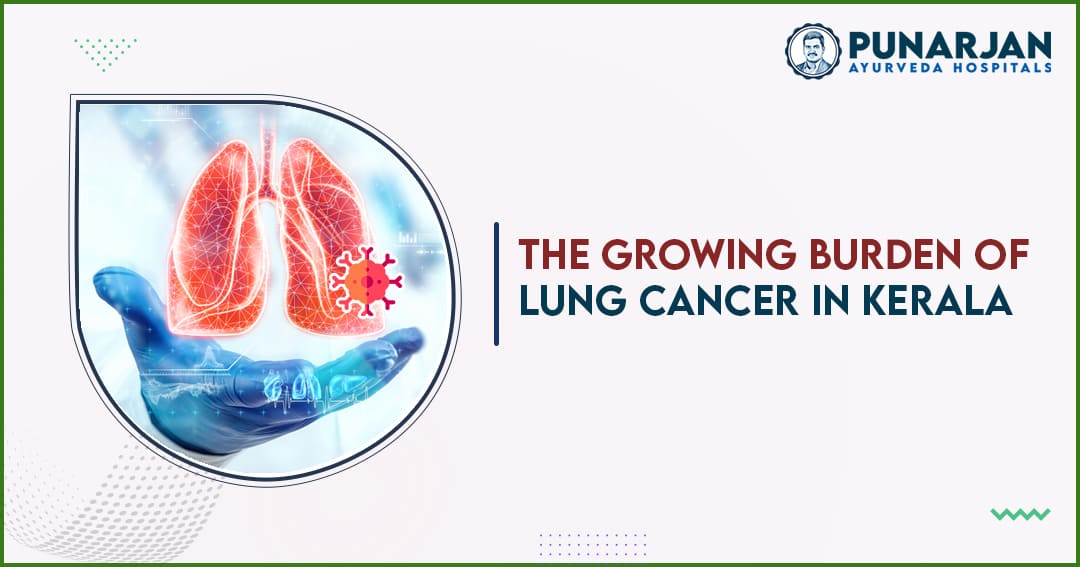
Lung cancer, a rampant culprit behind cancer-related fatalities globally, surfaces as a mounting quandary in Kerala, the southern Indian state celebrated for its commendable healthcare system. Kerala’s healthcare infrastructure, though stalwart, grapples with mounting lung cancer cases, necessitating profound pondering and the Role of the Best Cancer Hospital in Kerala. This article probes into Kerala’s burgeoning lung cancer quandary, scrutinizing its causative agents, ramifications on healthcare and society, and requisite redressals.
The Rising Incidence of Lung Cancer
A disquieting trend takes root within Kerala’s borders – lung cancer climbs ever higher. As a leading cause of cancer-related fatalities, it casts a shadow over the state’s populace. A comprehensive study spanning 13 years, from 2002 to 2015, scrutinizing population-based cancer registry data, reveals lung cancer’s alarming prevalence. Its menacing grasp accounts for nearly 8% of all fresh cancer cases and an even more distressing 10% of all cancer-related deaths in Kerala during that period.
The astonishing surge of lung cancer among males aged 60 years and above is particularly striking! The incidence and mortality rates have seen an unprecedented rise. From 2002 to 2004, incidence rates jumped from 5.9 to 8.7 per 100,000. And from 2013 to 2015, they soared even higher! Mortality rates surged from 4.7 to 7.3 per 100,000 population within that same time frame. The numbers are climbing!
Factors Contributing to the Rise
In Kerala, the burgeoning weight of lung cancer finds its roots in a web of intertwined factors. Chief among these is the sway of shifting lifestyles, with men increasingly entangled in the vice of smoking. Notably, the male populace bears the brunt of this burden. Yet, the influence of the environment should not be overlooked, as the insidious grasp of indoor and outdoor air pollution lends itself to the surge of lung cancer cases.
Moreover, chronic obstructive pulmonary disease and tuberculosis weave their threads in this complex tapestry. These ailments insidiously assail the lungs, rendering individuals more vulnerable to the insidious grasp of lung cancer’s clutches.
Technological Advances in Lung Cancer Diagnosis
Technology has brought about significant changes in diagnosing and treating lung cancer. Cutting-edge studies show that deep learning models hold promise for automating lung segmentation, nodule detection, and classification. This could improve diagnostic efficiency and accuracy, lighten the load on clinicians, and improve patient outcomes. The suggested framework shows impressive proficiency in lung segmentation, nodule detection, and nodule classification on the LUNA16 dataset.
Prevention and Control Measures
- Tobacco Control: Implementing stringent tobacco control policies can significantly reduce the incidence of lung cancer. A potential strategy is to elevate the taxes levied on tobacco goods., enforce bans on tobacco advertising, and engage in efforts to raise public knowledge about the risks of smoking.
- Air Quality Improvement: Improving indoor and outdoor air quality can also contribute to avoiding lung cancer. It can also help prevent lung cancer. Policies targeting pollution reduction, promoting clean energy usage, and enhanced ventilation in residences and workplaces can lead to this outcome.
- Vaccination: Vaccination fights against infections like HPV and Hepatitis B, reducing cancer risk, including lung cancer.
- Genetic Counseling and Testing: Genetic counseling and testing provide valuable data on their susceptibility. Moreover, it can offer guidance in formulating preventative measures for individuals who carry a history of lung cancer in their families or have other risk factors. Lifestyle modifications and enhanced monitoring can be part of this.
- Chemoprevention: Involves using natural or synthetic substances to prevent cancer development in high-risk individuals. Certain vitamins, minerals, and other nutrients have been researched to determine whether they can help prevent lung cancer. Nevertheless, further investigation is necessary to evaluate the potency of these compounds.
- Immunoprevention: This is a relatively new cancer prevention field involving stimulating the immune system to fight against pre-cancerous cells. Research is being conducted to formulate vaccines to prevent select cancers, including one specifically for lung cancer.
- Personalized Prevention Strategies: Due to progress in genomics and related disciplines, we can now create customized plans for preventing cancer. One aspect is to evaluate a person’s genetic composition, lifestyle choices, and additional variables. To devise a personalized approach to preventing cancer.
- Public Health Initiatives: Alternative A can be crucial in preventing lung cancer. These initiatives greatly influence the preservation of public health. One method is enforcing laws to manage and reduce air pollution; another is the execution of measures to regulate tobacco consumption and raise public awareness about the risks of carcinogen exposure.
- Healthcare System Enhancements: Boosting access to quality healthcare aids in early lung cancer detection and treatment. This means better screening, timely treatment, and attentive patient care.
- Research and Innovation: Ongoing exploration and innovation are vital for advanced lung cancer prevention and control tactics. This entails investigating causes, devising new prevention and treatment methods, and evaluating existing strategies’ efficacy.
Findings on Rasayana Ayurveda
The fascinating world of Ayurveda, which focuses on holistic well-being, offers a unique perspective on lung cancer management. Ayurveda advocates for ‘Rasayana’ herbs, known for their adaptogenic properties—substances that help the body adapt to stressors and normalize bodily functions. Thus, the stress of lung cancer could find an ally in the adaptogenic potential of Rasayana herbs.
Rasayana herbs, rich in powerful antioxidants, protect cells from the damage caused by free radicals, unstable molecules that are abundantly present. Using their antioxidant power, Rasayana herbs could slow the progression of lung disease, protecting lung cells from damage.
Interestingly, Ayurvedic plant products, including Rasayana herbs, are being examined for their potential radioprotective properties—protection from the harmful effects of radiation. In lung cancer, where radiation therapy is commonly used, Rasayana herbs could offer significant benefits as radioprotectors.
Intriguingly, Rasayana herbs may stimulate genotypic adaptation, potentially influencing genetic triggers for cancer. The unexplored potential of Rasayana Ayurveda for lung cancer is attracting researchers, filled with novelty and promise.
- Adaptogenic Properties: Within Ayurveda, Rasayana herbs exhibit extraordinary adaptogenic properties, normalizing bodily processes and aiding in stress adaptation. Remarkably, they defend against various biological, physical, and chemical stressors.
- Antioxidant Activity: The presence of powerful antioxidants in many Rasayana herbs proves significant. These substances effectively combat the harm caused by free radicals, unstable molecules generated in response to environmental and other pressures, potentially benefiting individuals with cancer.
- Immunostimulation: Studies suggest Rasayana herbs possess immunostimulatory effects, empowering the immune system to combat illnesses effectively. This boost in immunity could notably impact cancer by identifying and eliminating malignant cells.
- Radioprotection: Explorations into Ayurvedic plant products highlight their potential as radioprotective agents, safeguarding the body from radiation’s harmful consequences. Given the common use of radiation therapy for treatment, this could hold considerable relevance in lung cancer cases.
- Potential for Genotypic Adaptation: Recent data suggest that Rasayana herbs may influence genotypic adaptation, potentially impacting the genetic factors responsible for cancer development and progression.
- Safety: Rasayana Ayurveda’s plant drugs have proven safe in acute and subacute toxicity studies.
As for safety, Rasayana herbs show a remarkable safety profile in acute and subacute toxicity studies, making them a viable and dependable choice for long-term use.
To sum up,
In conclusion, addressing the growing burden of lung cancer in Kerala requires a multifaceted approach, given its complex nature. Lifestyle changes, environmental factors, and genetic predispositions intertwine, driving the rise in lung cancer cases. The disease has a profound socio economic impact, leaving a lasting imprint on the health and financial stability of those affected and their families.
Scientific research highlights the potential benefits of Ayurvedic practices, especially using Rasayana herbs, in managing lung cancer. Known for their adaptogenic properties, antioxidant activity, and immunostimulatory effects, these herbs could complement conventional treatments for lung cancer. Additionally, their potential radioprotective properties could mitigate the adverse effects of radiation therapy, a common treatment for lung cancer.
Punarjan Ayurveda Hospital, the Best Cancer Hospital in Kerala, leads the integration of these traditional practices into comprehensive treatment plans. However, it’s important to recognize that while these findings are promising, more research is needed to fully understand the potential benefits of Rasayana Ayurveda for lung cancer.
Preventive approaches, early detection, and access to quality healthcare are key pillars in addressing Kerala’s lung cancer burden. Public health measures, including tobacco control policies and screening programs, are imperative. Furthermore, improving access to diagnostic facilities and treatments, especially in rural areas, is crucial for ensuring equitable healthcare.
The fight against lung cancer is tough, but it’s a winnable war with the right strategies and the Best Cancer Treatment in Kerala.


